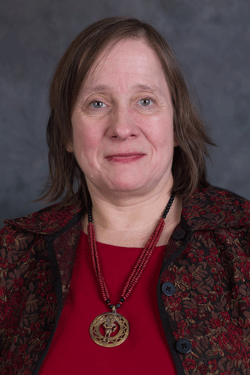 |
|
| Linda Long-Bellil, PhD, took part in a historic 1990 protest that was instrumental in getting the ADA passed. |
In 1990, disability rights activists crawled up the steps of the U.S. Capitol to highlight the inaccessibility of the building to those with disabilities. This act of civil disobedience by Linda Long-Bellil, PhD, and many other activists provided the impetus needed for Congress to pass stalled legislation aimed at prohibiting discrimination against individuals with disabilities—the Americans with Disabilities Act (ADA).
Because of her participation in the protest, Dr. Long-Bellil, assistant professor family medicine & community health, has been chosen as one of the Pioneers of the ADA. The honor means she will march during the July 22 Boston’s 25th anniversary celebration of the ADA, organized by the New England ADA Center. Long-Bellil also is a member of the committee organizing an ADA anniversary event in Worcester on July 25 that UMMS is co-sponsoring.
“It’s exciting these events are happening,” said Dr. Long-Bellil, who has spina bifida. “We really have made some strides in progress since the ADA was enacted and there is good reason to celebrate. I hope we make even more progress in another 25 years and that I’ll be there to celebrate it.”
Since the ADA was passed, there is increased accessibility for people with disabilities in communities, said Long-Bellil, who is part of the Disability, Health and Employment Policy unit within the Commonwealth Medicine division at UMMS. A court decision nearly a decade later further enhanced protections for individuals with disabilities. In 1999, the U.S. Supreme Court’s Olmstead decision held that unjustified segregation of people with disabilities constitutes discrimination and required that states take a more even-handed approach to making community-based services available to those individuals, allowing more people to move from institutions into the community.
“I think most of us who have disabilities feel more like full citizens of our nation since the ADA went into effect. From that perspective, it was very important,” Long-Bellil said.
Despite the increased accessibility for individuals with disabilities, more work needs to be done. The area needing the most improvement, Long-Bellil said, is employment.
In Massachusetts, 33 percent of working-age people with disabilities are employed, compared to 76 percent of people without disabilities, according to the American Community Survey. The Work Without Limits program, also part of Commonwealth Medicine’s Disability, Health and Employment Policy unit, is a statewide network of employers and community partners working to increase the employment rate of people with disabilities in Massachusetts.
Work Without Limits, a bronze sponsor of the Boston ADA celebration, has teamed up with the Perkins School for the Blind for the event. Together they have organized a group of businesses that will join them in the march, carrying signs bearing the names of their companies to show private sector support for the ADA.
“Work Without Limits is honored to be a part of recognizing the 25th anniversary of the signing of the Americans with Disabilities Act. Since that time, we have come a long way in ensuring people with disabilities have access to all aspects of our communities, including schools, transportation and telecommunications. But, there is still a lot of work that needs to be done, especially in the area of employment,” said Kathy Petkauskos, senior program director of Work Without Limits.
“Today we join together with a number of Massachusetts employers who are committed to including individuals with disabilities in their workplaces and are leading the way to significantly increase the employment rates of people with disabilities in our state.”
The protest Long-Bellil participated in at the U.S. Capitol was planned by ADAPT (Americans Disabled for Accessible Public Transit), a grass-roots group that organizes nonviolent disability rights demonstrations throughout the United States. The protest was included in a 2011 documentary, “Lives Worth Living,” about the disability rights movement.
Work Without Limits and the Eunice Kennedy Shriver Center at UMMS will present information and answer questions about programs for individuals with disabilities at the ADA celebrations in Boston and Worcester.
The Boston ADA celebration will be held from 11 a.m. to 3 p.m. July 22 on the Boston Common. Worcester’s 25th anniversary celebration will be held from noon to 4 p.m. July 25 at Union Station. A variety of entertainment planned for the Worcester event includes a wheelchair ballroom dance by Elaina Cardenas and Marcin Leszczynski.